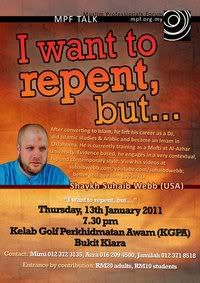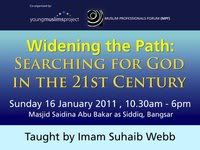Frederic Kanoute is a muslim soccer striker who plays for Sevilla in La Liga, Spain. Oumar Kanoute was named the 2007 African Footbaler of the Year. He spent more than US$700,000 to buy mosque for local muslim population in Spain.
Not Your Average Footballer

by André Tucic
Source: Qantara.de
http://en.qantara.de/webcom/show_article.php/_c-478/_nr-902/i.html
http://muslimsoccer.blogspot.com
by André Tucic
Frédéric Oumar Kanouté is no ordinary footballer: he has donated a large sum of money to a mosque, raises money for needy children, and takes a clear stance on the conflict in the Middle East.
Early last January, FC Sevilla beat Deportivo La Coruna 2:1 in the round of 16 of the Spanish Copa del Rey. While the two teams were battling it out on the pitch, bombs were raining down on the Gaza Strip. Frédéric Oumar Kanouté, Seville's 31-year-old striker, scored the deciding goal that put his team 2:0 up.
On that memorable evening, Kanouté demonstrated more than just football skills on the pitch; the devout Muslim felt compelled to make a statement about the Middle East conflict. Celebrating his goal, Kanouté pulled his jersey over his head, revealing a T-shirt emblazoned with the word "Palestine" in four languages.
The atmosphere in Ramón Sánchez Pizjuán stadium showed that the crowd was unsure what to make of the silent demonstration. The ref, on the other hand, knew exactly what he had to do and showed Kanouté the yellow card. The next day, the Spanish Football Association slapped a €3,000-fine on the football professional.
Political statements of any kind are forbidden on the pitch. FIFA has made it clear that slogans and political, religious, and personal statements on the players’ football kit are not welcome; the heated atmosphere of a football stadium is not the right place to engage in social disputes.
Religious principles and social involvement
Kanouté was well aware of this, but went ahead and made his statement anyway: "I felt I had to do it. Everyone should feel responsible when such injustice is done," explained the footballer.
It was not the first time that Kanouté showed that professional footballers are not necessarily dim-witted conformists. When Seville announced two years ago that a sports betting company would be sponsoring the team's kit, he refused to wear it.
The reason he gave was that his Muslim faith forbids him to gamble. José María del Nido, the club's president, was more than a little taken aback, but respected the striker's decision, and reached a compromise agreement with the sponsor: the name of the company would be covered over on Kanouté's jersey until such time as the sports betting company made a donation to an Islamic charity.
This solution, which was Kanouté's idea, was no randomly selected compromise: Kanouté has been raising money for social projects for a number of years. In 2006, he established the "Development Trust", an organisation that seeks to build not only a school, but an entire village for about 100 orphans in Mali.
Although born and raised in Lyon, France, Kanouté's roots are in the impoverished West African nation of Mali, where one in nine children dies before it reaches the age of 5, where 64 per cent of the population lives below the poverty line, and where life expectancy is 48.
Speaking up for the poorest of the poor
Not least his work for the Malian national football team showed him how important it is to lend a helping hand. With the support of FC Seville, and UNICEF, Kanouté organised a charity football match in the summer of 2008, the proceeds of which went to needy African children.
But his work for the needy does not just focus on Africa. In late 2007, Kanouté donated half a million euros to a mosque near Seville to save it from being closed.
Faith, he explains, has always meant a huge amount to him, his wife Fatima, and his two children Ibrahim and Iman. "I know how happy I am in this life. And I thank God for it," says Kanouté.
He started his career as a professional footballer at Olympique Lyon in 1997 and later played for West Ham United and Tottenham Hotspur before transferring to FC Sevilla in 2005. With the Andalusian team, the bearded striker with the shaven head and the gentle smile won the UEFA Cup in 2006 and 2007 and the Spanish Copa del Rey in the same year, the very competition he used as a soap-box for his political opinions earlier this year.
For his family and the people of Mali
Although selected for the French under 21 team, Kanouté didn't make the cut for the country's A team in 2004, at which point he decided to play for his father's native country, Mali.
Since then, he has played in the Africa Cup twice. In 2004, Mali came fourth in the competition and Kanouté was the top goal-scorer; in 2008, the team was knocked out in the first round. He was also named African footballer of the year in 2007.
"I dedicate this award to my family and the people in Mali," he said when presented with the award. "I believe that sport can help take development in Africa forward." At the very least, he is one of those sportsmen who is actively trying to make this happen.
Early last January, FC Sevilla beat Deportivo La Coruna 2:1 in the round of 16 of the Spanish Copa del Rey. While the two teams were battling it out on the pitch, bombs were raining down on the Gaza Strip. Frédéric Oumar Kanouté, Seville's 31-year-old striker, scored the deciding goal that put his team 2:0 up.
On that memorable evening, Kanouté demonstrated more than just football skills on the pitch; the devout Muslim felt compelled to make a statement about the Middle East conflict. Celebrating his goal, Kanouté pulled his jersey over his head, revealing a T-shirt emblazoned with the word "Palestine" in four languages.
The atmosphere in Ramón Sánchez Pizjuán stadium showed that the crowd was unsure what to make of the silent demonstration. The ref, on the other hand, knew exactly what he had to do and showed Kanouté the yellow card. The next day, the Spanish Football Association slapped a €3,000-fine on the football professional.
Political statements of any kind are forbidden on the pitch. FIFA has made it clear that slogans and political, religious, and personal statements on the players’ football kit are not welcome; the heated atmosphere of a football stadium is not the right place to engage in social disputes.
Religious principles and social involvement
Kanouté was well aware of this, but went ahead and made his statement anyway: "I felt I had to do it. Everyone should feel responsible when such injustice is done," explained the footballer.
It was not the first time that Kanouté showed that professional footballers are not necessarily dim-witted conformists. When Seville announced two years ago that a sports betting company would be sponsoring the team's kit, he refused to wear it.
The reason he gave was that his Muslim faith forbids him to gamble. José María del Nido, the club's president, was more than a little taken aback, but respected the striker's decision, and reached a compromise agreement with the sponsor: the name of the company would be covered over on Kanouté's jersey until such time as the sports betting company made a donation to an Islamic charity.
This solution, which was Kanouté's idea, was no randomly selected compromise: Kanouté has been raising money for social projects for a number of years. In 2006, he established the "Development Trust", an organisation that seeks to build not only a school, but an entire village for about 100 orphans in Mali.
Although born and raised in Lyon, France, Kanouté's roots are in the impoverished West African nation of Mali, where one in nine children dies before it reaches the age of 5, where 64 per cent of the population lives below the poverty line, and where life expectancy is 48.
Speaking up for the poorest of the poor
Not least his work for the Malian national football team showed him how important it is to lend a helping hand. With the support of FC Seville, and UNICEF, Kanouté organised a charity football match in the summer of 2008, the proceeds of which went to needy African children.
But his work for the needy does not just focus on Africa. In late 2007, Kanouté donated half a million euros to a mosque near Seville to save it from being closed.
Faith, he explains, has always meant a huge amount to him, his wife Fatima, and his two children Ibrahim and Iman. "I know how happy I am in this life. And I thank God for it," says Kanouté.
He started his career as a professional footballer at Olympique Lyon in 1997 and later played for West Ham United and Tottenham Hotspur before transferring to FC Sevilla in 2005. With the Andalusian team, the bearded striker with the shaven head and the gentle smile won the UEFA Cup in 2006 and 2007 and the Spanish Copa del Rey in the same year, the very competition he used as a soap-box for his political opinions earlier this year.
For his family and the people of Mali
Although selected for the French under 21 team, Kanouté didn't make the cut for the country's A team in 2004, at which point he decided to play for his father's native country, Mali.
Since then, he has played in the Africa Cup twice. In 2004, Mali came fourth in the competition and Kanouté was the top goal-scorer; in 2008, the team was knocked out in the first round. He was also named African footballer of the year in 2007.
"I dedicate this award to my family and the people in Mali," he said when presented with the award. "I believe that sport can help take development in Africa forward." At the very least, he is one of those sportsmen who is actively trying to make this happen.
Source: Qantara.de
http://en.qantara.de/webcom/show_article.php/_c-478/_nr-902/i.html
http://muslimsoccer.blogspot.com







No comments:
Post a Comment